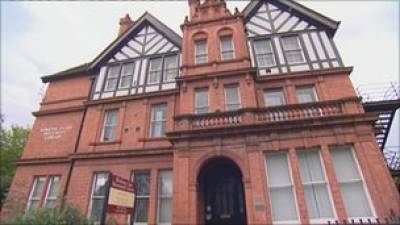Edward Carpenter was born in Brighton in 1844 into a large naval family with nine siblings. He studied at Brighton College and Trinity College, Cambridge. He was elected to a Clerical Fellowship and became a curate at Church of St. Edward but abandoned orders a year later striving for "the emancipation of the human body from the fetters of commercialism and Christianity".
He was very disillusioned with ecclesiastical affairs:
"The deadly Philistinism of a little provincial congregation; the trades-men and shopkeepers in their sleek Sunday best; the petty vulgarities and hypocrisies; the discordant music of the choir; the ignoble scenes in the vestry and the resumed saintly expression on returning into the Church; the hollow ring and sour edge to the 'incumbent's voice; and the fatuous faces up-turned to receive the communion at the altar steps".

Edward Carpenter
He went on to lecture on Astronomy, History of Science and Music to working men and women in Northern Industrial towns. Carpenter who was to become the foremost advocate of the cause of homosexuals, being of that persuasion himself, found the joy of personal liberation with the people of Sheffield he was now associating with. The lecturing lasted for seven years after which he provided a centre for socialists, cranks and visionaries on the Derbyshire Moors and settled down to his writing, emphasising the importance of personal action and ideals, criticising the idle rich, living in the labour of others.
To promote socialist propaganda in Sheffield he wrote England Arise!, a socialist marching song, rivalling Connell's Red Flag in the British labour movement. He wrote several pamphlets on homosexuality in 1894/95. He wanted to disassociate the idea of sex with sin and he emphasised the importance of sex education from childhood. He moved, with his life-long companion George Merrill, to Guildford when he was 80 and died five years later.
Carpenter, famous for his thoughts on spirituality, sexuality and socialism, was more of an anarchistic communist than a social democrat and his objective was "a personal democracy of free men and women in free and equal association", and the need for free expression of human personality, rather than political democracy. He is best known today for his writings and for his courageously honest gay lifestyle.
Resources in the Library by and about Edward Carpenter
Edward Carpenter, The intermediate sex: a study of some transitional types of men and women
[ca. 1921] - Shelfmark: E70
Edward Carpenter, Love's coming-of-age (1896) - Shelfmark: E70
Tony Brown, Edward Carpenter and late Victorian radicalism (1990) - Shelfmark: M44
Edward Lewis, Edward Carpenter: an exposition and an appreciation (1915) - Shelfmark: B02
Sheila Rowbotham, Edward Carpenter: a life of liberty and love (2009) - Shelfmark: E70

